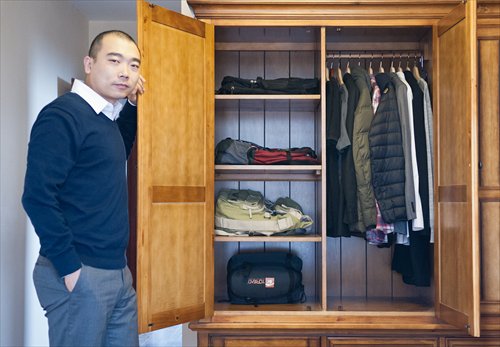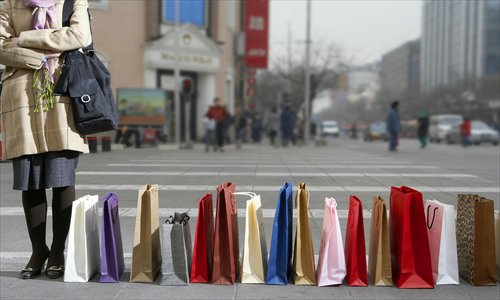Less is more
Swamped by consumerism, young turn away from possessions

Wang Zhe poses in front of his wardrobe, which only has about 30 items of clothing to meet all of his needs. Photo: Courtesy of Wang Zhe
Wang Zhe sat in front of his wardrobe, trying to pick a formal suit out from the hundreds of items of clothing in his collection.
The immense range of clothes included dozens of jeans from well-known brands, as well as a wide array of jackets lurking at the far end of the wardrobe. As he looked past the "basketball pants" he had asked his friend to buy in Hong Kong, he found he couldn't find any suitable formal wear.
At that moment, Wang, who works in human resources with an international company, felt that he had taken a few wrong turns in his life.
"I used to spend lots of money buying fashionable clothes, hoping to win people's recognition and attention. But at that moment I felt that I had just bought a bunch of useless rubbish," said the 34 year old.
Despite buying a new suit to solve his troubles, Wang came up with the idea of changing his life completely.
"Since then I have been struggling to be more of a minimalist," said Wang, referring to a trend toward reducing possessions and living simpler lifestyles. He has since brought his number of clothes items down from over 400 to less than 100.
100-item challenge
After seeing a challenge online, which encourages people to reduce their number of possessions, Wang gave it a try. The challenge said that participants should reduce the number of items they own to below 100, and the number of items of clothing to below 33.
"A pair of socks is two items. And 100 items can supposedly satisfy all your personal demands," said Wang. "It's easy for you to throw away items from 400 to 300, from 300 to 200. But it's hard to limit the number from about 120 to less than 100."
When Wang felt uncertain and unwilling to throw away some objects, he packaged them together and set a time limit on how long he would keep them. "If the items have not been used in the next six months, I will throw them away," Wang said.
During the process of throwing things away, he noted that it is a process of contemplating your life and what is important to you.
Considering himself an intellectual, Wang used to have a wall of books in order to create an atmosphere of a scholarly residence.
"I used to buy mountains of books but only read them pages at a time. I gradually realized that gaining knowledge does not come through a wall of books."
One month later, he gave some precious books to friends and others to libraries.
In addition to donating and giving the items to other people, Wang has a "one in, one out" rule to limit his items to less than 100.
"Most of the time I will get a new item when the old one is broken. But if I have something that I like so much, I will donate the old one first to get the new one," said Wang.
In a recent accounting, Wang had only 87 items. "I care about the quality rather than the quantity of items. Using money that could buy seven pairs of jeans, I buy one item of clothing I need. The money saved is instead spent on things that I really want, like traveling."

With materialism on the rise in China, some people are trying to move away from a life focused on acquiring possessions. Photo: IC
The lure of materialism
On China's Single's Day, which falls on November 11 each year, online sales on Taobao and Tmall this year skyrocketed by more than 50 percent over the previous year's figure, reaching a total of 57.1 billion yuan ($9.3 billion) in a single day. According to the Beijing Youth Daily, about 280 million orders have been placed and over 217 countries and regions were roped into the shopping frenzy.
On that day, Wang's circle of friends showed off their purchases on various online platforms.
"They saw me as a 'weird' person because I bought nothing. I think most of them buy things just because they don't want to be different from everyone else, rather than buying really useful stuff," said Wang.
Feng Gang, a sociologist with Zhejiang University, told Metropolitan that for most Chinese people, the desire to increase their number of possessions goes far beyond their actual material needs.
"Their desires are unsatisfied. It's understandable for Chinese people, because we are just getting rid of poverty and have the money to squander. But we have gone so far," said Feng.
Various tales of consumerism gone wild have attracted public attention. In November, Xinhua reported that a woman cheated friends out of 300,000 yuan so she could spend it shopping. In August, news website msn.cn reported that a young Chinese woman became a prostitute just to buy a luxury-brand bag.
"We are in a society where people are controlled by items," said Wang. "The pursuit of brands and luxuries show that people are not confident in their own hearts. They care too much about what other people think."
Desire for simplicity
"The essence of minimalism is not only about minimizing your possessions, but to be more simple in your goals and spirits," said 34-year-old Song An, a worker in an e-commerce company.
Song discovered the concept in the year Apple founder Steve Jobs died. He read his biography and found that Jobs had pursued a minimalist style.
"I saw a photo of his [Jobs] living room, which was spacious but had little furniture. He thought most of the furniture was unfit for the atmosphere. The way he knew what he really wanted inspired me," Song recalled.
At that time, Song jumped from an IT company where he worked in the marketing department to a finance company where he was promoted to a manager's position.
"When I left the IT industry, which I was once familiar with, I began to think more about life goals. I felt like I didn't like the job in the finance company. After struggling for three years, I quit and went back to the IT industry," he said.
"You should know how to choose and what to give up. Finding a job is a good example. You should always know what you really want and stick to one thing," noted Song.
In contrast to Song's approach, others try to minimize social interaction that doesn't bring them fulfillment. Zhu Li, 27, is an accountant living in Shanghai. Like her peers, she has a cell phone ringing all the time and often hangs out with friends. She earns a monthly salary of about 6,000 yuan but most of it is spent hanging out with friends.
"Trapped by the complex relationships, I didn't have time or money for my hobby, playing the piano. And I wanted to change," said Zhu.
"I now seldom use social media like Weibo and WeChat and I come out to meet friends on a monthly basis. I have rediscovered my hobby."
Minimalist lifestyle
A common view in the West, as seen in a number of films and books, is that the concept of a minimalist lifestyle is rooted in Buddhist religions which have a long history in China, and also advocate the shedding of possessions.
Master Lijing, a professor at the Buddhist Academy of China, said that according to Buddhist beliefs, everything is impermanent and that people's obsessions towards owning things is the cause of suffering. "So Buddhism advocates a similar principle to minimalism because everything is changing and you can't hold on to possessions," said Lijing.
As a core member of a minimalist lifestyle group which consists of 6,234 people on douban.com, Wang noted that many of the members are newcomers to the group.
"In China, there are very few people who embrace the idea of cutting down on their possessions," said Wang.
Feng said that "so far the Chinese people who practice a minimalist lifestyle are still limited to those few intellectuals who have engaged in introspection about their actual needs."
According to Feng, China is in a transitional phase and it will not take a long time for people to divert their attention from consumerism to less materialistic pursuits.
"So far the promotion of minimalism is not strong. The country still needs to encourage people to spend more money to drive domestic demand. But in the long run, the development of the economy should return to rationality. And Chinese people will develop a clearer sense of the worth of possessions."
Wang said that his understanding of the minimalist lifestyle means "minimizing your possessions, minimizing your desires, cutting down on shallow social relationships and concentrating all your energy on things that are really valuable and meaningful."
"This can release you from being a slave of desires and bring you real happiness," he said.